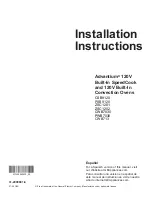
GB
2
5
P
r
e
c
a
u
ti
o
ns
an
d
ti
p
s
This appliance has been designed and manufactured
in compliance with international safety standards. The
following warnings are provided for safety reasons and
must be read carefully.
G
e
n
e
r
al
sa
f
et
y
The appliance was designed for domestic use
inside the home and is not intended for commercial
or industrial use.
The appliance must not be installed outdoors, even in
covered areas. It is extremely dangerous to leave the
appliance exposed to rain and storms.
W
hen moving or positioning the appliance, always
use the handles provided on the sides of the oven.
Do not touch the appliance with bare feet or with wet
or damp hands and feet.
The appliance must be used by adults only for the
preparation of food, in accordance with the
instructions provided in this booklet.
D
o
no
t
t
o
uch
th
e
h
e
at
in
g
e
l
e
m
en
ts
a
n
d
parts
o
f
th
e
o
v
en
d
oo
r
w
h
en
th
e
appl
i
a
n
c
e
i
s
in
us
e
;
th
e
s
e
parts
b
e
c
o
m
e
e
x
tr
e
m
e
l
y
h
o
t.
K
ee
p
ch
i
ldr
en
w
e
ll
a
w
a
y f
r
o
m
th
e
appl
i
a
n
c
e
.
Ensure that the power supply cables of other
electrical appliances do not come into contact with
the hot parts of the oven.
The openings used for the ventilation and dispersion
of heat must never be covered.
Always grip the oven door handle in the centre: the
ends may be hot.
Always use oven gloves when placing cookware in
the oven or when removing it.
Do not use aluminium foil to line the bottom of the
oven.
Do not place flammable materials in the oven: If the
appliance is switched on accidentally, it could catch
fire.
W
hen unplugging the appliance, always pull the plug
from the mains socket; do not pull on the cable.
Never perform any cleaning or maintenance work
without having disconnected the appliance from the
electricity mains.
If the appliance breaks down, under no
circumstances should you attempt to perform the
repairs yourself. Repairs carried out by
inexperienced persons may cause injury or further
malfunctioning of the appliance. Contact a Service
Centre (
see Assistance
).
Do not rest heavy objects on the open oven door.
Do not allow children or persons who are not familiar
with the appliance to use it, without supervision.
D
i
s
p
osal
W
hen disposing of packaging material: observe
local legislation so that the packaging may be
reused.
The European Directive 2002
/
96
/
EC relating to
W
aste
Electrical and Electronic Equipment (
W
EEE) states that
household appliances should not be disposed of using
the normal solid urban waste cycle. Exhausted
appliances should be collected separately in order to
optimise the cost of re-using and recycling the materials
inside the machine, while preventing potential damage
to the atmosphere and to public health. The crossed-out
dustbin is marked on all products to remind the owner
of their obligations regarding separated waste
collection.
For further information relating to the correct disposal
of exhausted household appliances, owners may
contact the public service provided or their local
dealer.
R
es
p
e
c
t
in
g
a
n
d c
o
n
se
r
v
in
g
t
h
e
e
n
v
i
r
o
n
m
e
n
t
You can help to reduce the peak load of the electricity
supply network companies by using the oven in the
hours between late afternoon and the early hours of the
morning. The cooking mode programming options, the
delayed cooking mode (
see Cooking modes
) and
delayed automatic cleaning mode (
see Care and
Maintenance
) in particular, enable the user to organise
their time efficiently.
Always keep the oven door closed when using the
BARBECUE and GRATIN modes: This will achieve
improved results while saving energy
(approximately 10%).
Check the door seals regularly and wipe them clean
to ensure they are free of debris so that they adhere
properly to the door, thus avoiding heat dispersion.
Summary of Contents for F 1012.1 IX/HA
Page 71: ...PT 71 ...
Page 72: ...72 PT 10 2007 195061760 01 XEROX BUSINESS SERVICES ...
















































